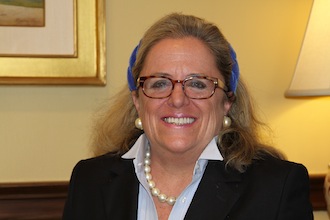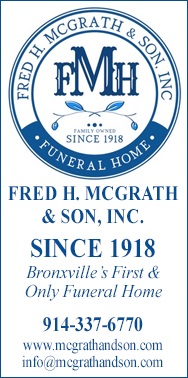From the Mayor: Roundup of State Legislation Affecting Local Governments

Nov. 27, 2013: During the recently ended New York State legislative term, over 16,000 bills were proposed in just two years. Thankfully, a vast majority of them died in committee. As Mark Twain is reputed to have said, "No man's life, liberty or property is safe while the legislature is in session."
No major reforms were undertaken and very little legislation directly impacts the village.
The binding arbitration law that allows firefighters and police to go to outside arbitrators when an impasse is reached in negotiations was tweaked, but not in the village's favor. It now uses "ability to pay" as the main driver of pay raises, so any community who was frugal and amassed a fund balance for a rainy day will be penalized. In an ironic twist, arbitrators' awards are not subject to the 2% tax cap, though the municipality paying the raise is so bound.
A bill currently sitting on the governor's desk, though seemingly innocuous, would set a new and unusual precedent. The proposed law would require local governments to provide mandatory training to local dog control officers. The local government would then be given the authority to solicit and accept funds from any public or private sector source to cover the cost of such training. This would be the first time that fundraising would be allowed for a mandatory municipal purpose.
As a member of the Legislative Priorities Committee of the New York Conference of Mayors Association, I recently met with approximately 25 of my colleagues to prioritize an agenda for advocacy for the upcoming 2014 legislative session. Priority one is an increase in revenue-sharing funds from the state, which have decreased by over 7% just since 2009. For decades, the original fairly thought-out "revenue sharing" formula, intended to redistribute state tax revenues, has been disregarded, making the revenue stream inconsistent, unfair, and unpredictable.
Mayors across the state support an increase in local funding based on a formula that takes into account the types and level of services a community must provide, as well as the amount of tax-exempt properties within local boundaries.
Continuing on the tax-exempt subject, according to the New York State Comptroller's Office, $680 billion in market value of real property in New York State (27%) is exempt from municipal taxes, equating to approximately $17 billion yearly in foregone property tax revenue. However, the tax-exempt entities need essential municipal services. A proposal that would permit municipalities to impose charges just to defray the cost of local services including police and fire protection, street maintenance, and lighting seems only equitable.
The Commonwealth of Massachusetts, in a unique experiment, called upon all their nonprofits to voluntarily contribute commensurate with the services they received, and many have responded in kind. Even if municipalities recoup only a portion of the expenses they incur serving tax-exempt organizations, it would be a step forward.
As always, the elephant in the room is the New York State Pension System. Conservative estimates say that state and local employer contributions will more than double by 2016, adding nearly $4 billion to annual taxpayer costs, leading logically to reduced services in tandem with property tax increases.
The current legislators, I would argue, are the true enemies of the loyal municipal worker, as they ignore reforms to an unsustainable pension system. The end result could very well be a result like Detroit, where hardworking people are now getting 16¢ on the dollar in retirement.
At the very least, the 3% employee contribution that was eliminated in 2000 should be reinstated. It would still give municipal workers a 97% versus 3% contribution rate, unheard of in any other existing industry.
My fellow local lawmakers also want to exempt costs to repair aging infrastructures from the current 2% property cap. Though school districts are exempt, despite one of the most aging infrastructures in the country, New York State communities are disincentivized from doing any capital repairs, as their costs are not exempt from the state tax cap.
Your village trustees, in an expression of the value of local control, routinely override the governor's tax cap legislation on principle though we rarely exceed the cap. We prefer to be accountable in local elections if we do not exert the fiscal controls village residents expect.
My colleagues and I also support legislation to constitutionally prohibit laws or regulations that would impose a direct or indirect fiscal burden on local governments unless a parallel appropriation is made sufficient to hold local governments harmless.
In addition, we will advocate that all current unfunded mandates such as the MTA tax be required to sunset in two years unless it could be shown they serve an essential purpose and a state funding source can be found to offset the cost to local governments.
Another very specific unfunded mandate is the requirement of local governments to publish official notices in local newspapers. However, with the decline in newspaper circulation and the proliferation of Internet access, state law should be amended to allow local governments to leverage the power of the Internet to reach interested parties in a more timely, efficient, and cost-effective manner.
No longer can local government just advocate for positive change or for what they might need; we now have to play defense and constantly monitor the fiscal and regulatory effects of every potential bill.
As one of my colleagues said, "If local governments are not at the table, we may find ourselves on the menu."
Financial & Legal Assistance Directory
Hymes & Associates, CPA, P.C.
Our firm provides outstanding service to our clients because of our dedication to the three underlying principles of professionalism, responsiveness, and quality.
Listed as one of the 10 largest firms by The Westchester Business Journal, we serve clients throughout the tri-state area. By combining our expertise, experience, and
the energy of our staff, each client receives close, personal and professional attention.
Our high standards, service, and specialized staff spell the difference between our outstanding performance and other firms. We make sure that every client
is served by the expertise of our whole firm.
Hymes & Associates, CPA, P.C.
55 Pondfield Road
Bronxville, NY 10708
914-961-1200
914-961-1715 (Fax)
Website: www.hymescpa.com
Baillie & Hershman
44 Pondfield Road, Suite - 12
Bronxville, N.Y. 10708
Office: 914-337-6300
Matthew W. Kerner, ESQ.
Direct Dial: 914-337-6569
Email: This email address is being protected from spambots. You need JavaScript enabled to view it.
Fax: 914-337-6913
Suzanne M. Bloomer, Esq.
Direct Dial: 914-337-0142
This email address is being protected from spambots. You need JavaScript enabled to view it.
Baillie & Hershman provides comprehensive Real Estate legal services for buyers, sellers, current owners, real estate agents and lenders. We also handle estate planning, including the drafting of wills.
Griffin, Coogan, Sulzer & Horgan, P.C.
Attorneys and Counselors at Law
Griffin, Googan, Sulzer & Horgan, R.C.
Located in Bronxville, New York, Griffin, Coogan, Sulzer & Horgan, P.C. takes great pride in providing our clients with comprehensive, high quality legal services in a responsive manner. The firm concentrates its practice in real estate law with a primary focus on issues relating to real estate tax litigation (also known as tax certiorari), real estate transactions, valuation law, real property taxation and tax planning and real property tax exemption matters throughout New York State.
The firm serves as general counsel for several local cooperatives and represents clients in various issues relating to wills, trusts and estate planning.
51 Pondfield Road
Bronxville, NY 10708
(914) 961-1300
This email address is being protected from spambots. You need JavaScript enabled to view it.
Nobile, Magarian & DiSalvo LLP
We are hardworking and dedicated attorneys who, combined, have more than 150 years of experience delivering quality legal advice. Our cutting edge is our ability to enter both the conference room and the courtroom with strength. Our law firm provides legal representation and counsel for both individual and business clients on issues related to estate planning and administration, real estate law, litigation, and business law. Our practice areas include: Commercial Litigation, Business Law, Real Estate, Wills, Estate Planning, Trusts, Estate Administration, Living Wills, Health Care Proxies, Powers of Attorney, Not For Profits, and Employment Law.
111 Kraft Avenue
Bronxville, NY 10708
914-337-6300
Veneruso, Curto, Schwartz & Curto, LLP
Veneruso, Curto, Schwartz & Curto is dedicated to providing businesses and individuals with exceptional legal services customized to each client's needs and objectives. Practice areas include litigation, real estate, not for profit, wills and estate planning, land use and zoning, business and corporate, cooperative and condominium and real estate tax assessment litigation.
The Hudson Valley Bank Building
35 East Grassy Sprain Road, Suite 400
Yonkers, New York 10710
914-779-1100
Aegis Capital
Steve brings 40 years of investing experience to his role as Senior Managing Director at Aegis Capital Corp., a prominent national securities firm.












